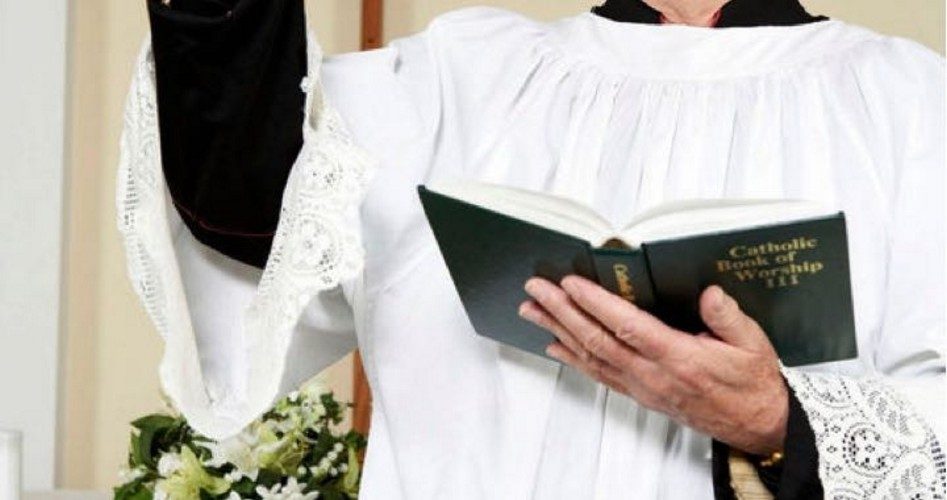
Aside from the obvious victims of clerical sexual abuse scandals afflicting the Catholic Church are those victims who get far less press but have been violated all the same: falsely accused priests.
William Donohue, a noted authority on clerical sexual abuse who leads the Catholic League for Religious and Civil Rights, pointed out that “prior to 1985, it was the parents of the abused who reported molestation.” Since then, most accusations come from adults who say they were abused as children. Along with the rise of self-reporting has been an increase in false accusations. In the court of public opinion, being branded with that scarlet letter more often than not means you are presumed guilty until proven innocent.
Take the case of Irish priest Father Kevin Reynolds, who supposedly raped and impregnated a 13-year-old girl during his missionary work in Kenya. Irish national television network RTE broadcast the story as fact in 2011, based only on the accusation of the alleged victim who claimed that her daughter was his child. Father Reynolds’ bishop immediately removed him from his parish, even though the Kenyan bishop under whom Reynolds had served reported that the priest had a spotless record, and Reynolds himself volunteered to take a paternity test. After two independent DNA tests proved that Reynolds was not the father, the network issued a public apology and settled a defamation case brought by the priest for more than U.S. $1 million. But the damage is done because Reynolds will forevermore wear a scarlet letter — except now his “A” stands for “accused and acquitted” rather than “abuser.”
In a way, Reynolds was fortunate because he was able to verifiably clear his name with a paternity test. Others do not have as clear a defense and therefore suffer even more than he. Father Gordon MacRae has been in a New Hampshire prison for nearly 24 years, serving a life sentence for alleged crimes of sexual abuse. “Brought with no evidence or corroboration whatsoever, the claims were accompanied by monetary demands which his diocese settled for hundreds of thousands of dollars despite evidence of fraud.” This quote from the award-winning blog These Stone Walls, funded by Friends of Father Gordon MacRae. This priest has maintained his innocence through the years despite overwhelmingly tempting motives for admitting guilt. “Had he accepted one of several well documented pre-trial ‘plea deals’ offered by the State, he could have left prison after one year.”
Pulitzer Prize winner Dorothy Rabinowitz of the Wall Street Journal Editorial Board wrote of Father MacRae, “Those aware of the facts of this case find it hard to imagine that any court today would ignore the perversion of justice it represents.”
Father Bob Poandl is another priest fighting from behind prison bars to overturn his conviction in federal court for sexual activity with a minor — a single accusation against a priest with an otherwise spotless record. “Imagine trying to defend yourself from the viewpoint of being innocent…. It is almost impossible given the current environment,” said Joe Maher, president of Detroit-based Opus Bono Sacerdotii (Work for the Good of the Priesthood), as quoted by Channel 9 WCPO Cincinnati. “It’s almost as if anyone who makes an accusation against a priest — no matter how long ago, 10, 20, 30, 40 years — they are immediately guilty in the court of public opinion. And the court of public opinion matters because that’s where you draw your jury selection from.” Maher co-founded Opus Bono Sacerdotii in 2002 after his own parish priest was accused and later acquitted of rape charges.
“I understand why people, including clergy, take their own lives in situations like that,” Father Tim Hazelwood told the Irish Times. His bishop forced him from his parish and from public ministry when a young man accused him of rape in 2010. Six years later, the terror ended when his accuser signed a retraction, admitting he had lied. Father Hazelwood publicly forgave the man and even begged the High Court’s mercy, expressing his desire to forgive as Christ had done when He was falsely accused. But the priest sympathizes with those in similar circumstances. “You don’t know where to turn,” he explained. “The shame is a huge thing. Shame, helplessness, and powerlessness. How can you prove it’s not true?”
The important lesson in these stories is that, though sexual abuse certainly does happen, not every accusation is gospel truth. In the face of the truly alarming Pennsylvania grand jury report, it is worth remembering the aftermath of the 2002 clerical abuse scandal uncovered by the Boston Globe. Media watchdog Dave Pierre of NewsBusters.org told the Catholic World Report that a review of all cases investigated revealed “the sobering figure that one third of accused priests in the Archdiocese of Boston were accused falsely.”



